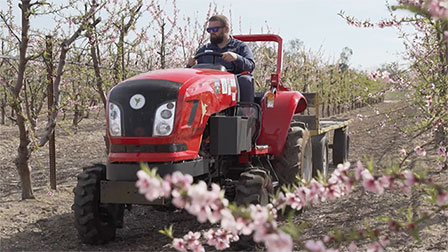March 24, 2021
California Farms Go Green with Zero-Emission Electric Tractors (Text Version)
This is a text version of the video segment California Farms Go Green with Zero-Emission Electric Tractors, which aired on March 24, 2021.
JOHN DAVIS: Many auto makers are pledging to go all-electric in the near future, so other forms of hard-working machinery are starting to follow suit, including down on the farm where Green Acres is truly the place to be. Although farm tractors and the jobs they do have become more sophisticated and high-tech over the years, the heavy chassis and engines under the hood haven't always kept pace with that progress, and most still rely primarily on diesel fuel.
Hummingbird EV is one company looking to upset that status quo apple cart. They've teamed up with the San Joaquin Valley Clean Cities Coalition, Project Clean Air, and others to place four prototype zero-emission electric tractors in service at one of the country's largest fruit growers. These EV tractors are fitted with 120 peak kilowatt electric motors tied to Hummingbird controllers and software. With 25 kilowatt-hour battery packs and 65 horsepower, performance is equivalent to a gas or diesel tractor of the same size.
Moonlight Companies, in Reedley, California, is an ideal test bed. They operate year-round, growing all varieties of citrus and stone fruits—from peaches, plums, and pomegranates to grapes, lemons, oranges, and, during our visit, lots and lots of mandarins—and shipping them fresh to markets all over the globe. This third-generation farm is committed to using environmentally sound practices and investing in the latest technology. They even have a 2-megawatt onsite solar farm, which powers much of their packing and cold-storage operations. So trying out these EV tractors for the past year was an easy call.
TY TAVLAN: We use approximately 80 small diesel-powered tractors during the harvest season to pull our fruit through the field. For this particular function, since it pulls fruit, and then it stops—and then it pulls fruit again and then it stops—we can get approximately two days' worth of work out of the tractor. What we really like about it is, it's basically maintenance-free, it starts every time, and it works just fine.
JOHN DAVIS: The battery-electric tractors in this test are paired with an all-electric Class 6 vehicle-to-vehicle charging truck, also designed by Hummingbird. It can provide up to 40 kilowatts of level 2 AC charging, enough to juice up two tractors simultaneously, eliminating time-consuming round-trips back to the charging station—a big advantage, especially during harvest. The truck itself has an 88 kilowatt-hour battery pack and 90 miles of range. Hummingbird's expertise is designing and scaling electric powertrains for medium-duty applications like mining, utilities, and food delivery. And they are challenging the notion that one size fits all down on the farm.
RAKESH KONERU: Every tractor has a certain demand in terms of the battery pack size and things like that—how long they use, how long they drive, so on and so forth. So where we're unique then is we're trying to adapt where the commonality of parts come into play. So, when you try to scale it up, it's easy to mix and match a production line with different scale of vehicles with the same system.
JOHN DAVIS: Like any farm in America, economics comes into play here too. Drought conditions in California and elsewhere have forced growers to cultivate fewer acres to conserve water, meaning tighter crop density is the key to making ends meet. So tractors of the future may need to hug the ground to fit under closely planted trees or be extra skinny to drive between them.
RAKESH KONERU: The main idea for us was to showcase the capability of what an electrification can bring into farm, but at the same time, we're also exploring the idea of what it takes for the farmer to be ready for future farming. And every farm has a different, unique requirement. If you go to a vineyard, for example, their needs are completely different, so when we see the market expansion, we want to explore the idea of, let's design a chassis from the ground level up, which is well thought through, which can stick on for the next generations.
JOHN DAVIS: This type of custom design is well suited for the flexible packaging afforded by electric battery packs. So it looks the E-volution of modern farming in the near future may well be fueled by the EV revolution of today.
